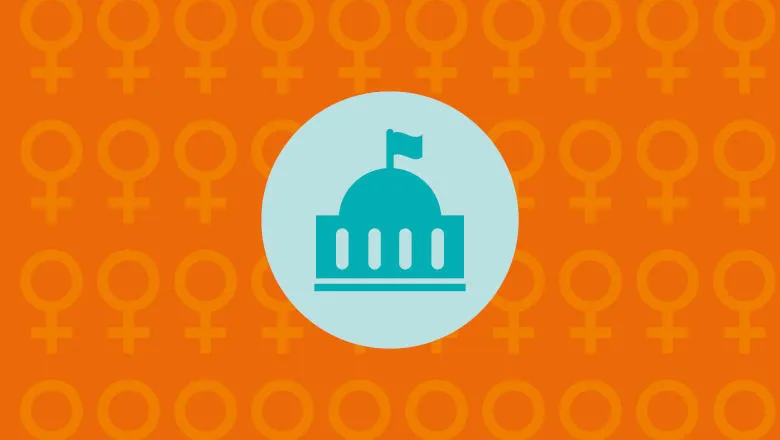21 August 2018
Driving change in the region with the world's worst record for women's political representation
Jen Clark, Program Manager, International Women’s Development Agency
Women make up just 7.5% of parliamentarians in the Pacific region

The most important advances in women’s rights have been secured through women’s movements. From the English suffragettes who won women the right to vote, to the global #MeToo movement, the message is clear: change happens when women raise their voices and act together.
Women represent only 24% of parliamentarians worldwide. But in the Pacific region the situation is even more acute, with women comprising only 7.5%, the lowest in the world. There are four countries with no women MPs at all, and three of these are in the Pacific.
Of course, supporting women’s political leadership is about much more than numbers and equal representation – it is a means of achieving transformative, sustainable progress towards gender equality.
Addressing barriers to women’s political leadership
Women in the Pacific region face substantial barriers to political participation, of which gender norms and stereotypes are perhaps the greatest. Communities generally perceive leadership, particularly in political spaces, as the domain of men. Women’s leadership capabilities are continually called into question, limiting both their aspirations and opportunities.
Another major barrier is women’s limited access to funds to conduct competitive elections. With the rise of money politics in the Pacific, recent research by the United Nations Development Programme in the Solomon Islands found access to adequate financial resources has become the primary obstacle facing aspiring female political leaders.
If they do manage to overcome such obstacles, once elected, women then face a new set of challenges to gain influence among male-dominated political networks. Here barriers include both informal gender norms and the formal rules governing the operation of parliaments, which are designed by male MPs.
The power of coalitions
Our groundbreaking Women’s Action for Voice and Empowerment (WAVE) programme supports women-led coalitions to address these barriers and increase the representation of women in social, economic and political leadership positions. Evidence tells us that ‘thinking and acting politically’ is critical to success. Women’s rights organisations, like individual women, are experienced in navigating the complex dynamics of power and politics and together we back women’s judgement to design politically-smart interventions driven by local context.
In Timor Leste a coalition of women’s groups, including WAVE-supported partners the Alola Foundation and Rede Feto, launched a broad, grassroots campaign to challenge community attitudes about women’s leadership capabilities and managed to almost double the number of women elected in village local elections from 11 in 2009, to 21 in 2016. They also helped introduce gender quotas in the 2016 Suco Election Law: as a result, there was a 20-fold increase in the number of women candidates.
In the Solomon Islands, which currently has only two women MPs, successful campaigning by a growing WAVE-supported women’s movement, led by Solomon Islands Women’s Rights Action Movement, has built momentum towards the introduction of reserved parliamentary seats for women, a form of gender quota, at the provincial level. Western Province Premier Wayne Maepio has publicly declared his government’s commitment to reserved seats and asked the women’s movement to help develop broad-based support for the policy.
Long-term, tailored support
Research shows it is critical to provide sustained, tailored support to women throughout the electoral cycle – not just in the months leading up to an election. WAVE is supporting progressive women candidates with a reasonable prospect of success, before, during and after elections.
In Myanmar, for example, Women’s Initiative Platform is now training a pool of campaign coaches to support potential women candidates in preparation for the 2020 national election. Once elected, they are supported by the country’s first structured political mentoring programme for women, which helps them to navigate male-dominated spaces and improve their power and influence by matching Myanmar women MPs who are committed to gender equality with Australian women MPs with similar commitments. The programme is implemented by Akhaya Women and draws on learnings from EMILY’s List Australia on the power of women MPs supporting one another.
Lway Nan Moe, an MP from the Ta’ang ethnic party, talks of her mentor, Judith Graley MP, as a close friend:
‘As we are both women politicians, it didn’t take long to develop trust and open communication. The way Judith struggles in this sexist environment, is so similar to me. Judith stands behind my back and encourages me. We women MPs need someone behind us, supporting us … I hope one day I’ll become a mentor for someone who needs me.’
The experiences of IWDA’s WAVE Program mirror what we have seen repeated throughout history: strong women’s movements are critical for advancing women’s political leadership. It is essential that we invest in and support these movements. Women’s voices are louder, and our power amplified, when we work together.
